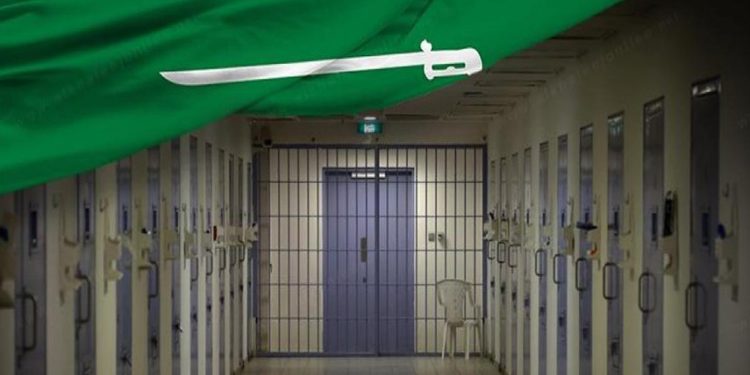
Social media activists launched a solidarity campaign with detainees whose sentences have expired, and those who have been in prison for several years and have not been tried to this moment.
Sheikh Khalaf al-Enezi, detained for more than 11 years in Saudi prisons for no reason, was tortured and beaten during his detention. In 2017, authorities sentenced him to three years in prison.
Saud al-Obeid al-Qahtani, nicknamed “Dean of Political Detainees”, is one of these preachers detained without a fair trial. He enters his 27th year in al-Tahayyat prison in Buraidah province after he was arrested in 1991 in Medina on charges of distributing leaflets against the Saudi government.
Al-Qahtani spent the first ten years of his detention without charge, was not allowed to hire a lawyer, and was tortured during his detention and movement between the prisons of the city, Abha, al-Hayer, and Dahaban, before settling in the Al-Tahtiya prison run by the Saudi Mabahith, state security agency, where more than 3,000 political detainees are detained on “terrorism cases”.
After ten years of detention without trial, al-Qahtani was sentenced to 18 years in prison, ending his sentence in 2009, but the prison administration had a different opinion, when he informed his brothers of the decision to extend his detention for another seven years, and told them that he would be brought back to trial unless he change his views.
In 2016, al-Qahtani’s seven years in prison ended, but the “dean of the political detainees” did not get out of his cell and remained in detention without justification, at a time when his family confirms that his health and psychological deterioration dramatically, especially after his solitary confinement for a year and a half.
The father of Saud al-Qahtani has filed a complaint against Mabahith, for committing violations of the law against his son, who was detained for nearly 27 years.
Unlike many cases of detainees, the case of Sheikh al-Qahtani (former Aramco engineer) took no space in the media, which is the main custodian of thorny issues in the country.
Born in Unayzah, born in 1965, Walid al-Sinani is considered one of the oldest political detainees in the kingdom, although he is the second longest political detainee in the country. Al-Sinani, who has been in al-Hayer political prison in Riyadh since 1995, had a large reputation on the Saudi arena, for several reasons.
Walid bin Saleh al-Sinani is a Saudi preacher who spent 23 years in al-Ha’ir al-Siyasi prison. He was known for his strong criticism and atonement for the Saudi government.
Before the Gulf crisis in 1990, he believed in the legitimacy of the kingdom and defended it enthusiastically until the Gulf crisis occurred and the state used half a million US troops on the land of the Arabian Peninsula with an official fatwa from the Senior Ulema Council.
he concluded after this event that the Saudi rulers had lost its legitimacy.
Walid al-Sinani was taken to the Supreme Court in Riyadh and the judge tried to find a way that would please the state and at the same time not being harsh on him. The judge ensured to Walid that he will convey his sayings to the state on condition that he stops talking about them in public.
After Walid rejected the judge’s offer, he was punished with complete isolation from the world from 1423 AH to 1430 AH.
During this period and in response to his insistence on the legitimacy of the state, the Ministry of Interior commissioned a group of sheikhs, including members of the Council of Senior Ulema in the fatwa that Sheikh Walid should be killed as an external thought. After the fatwa was prepared the Prosecutor again submitted to the court demanding the killing of the Sheikh, he said he wouldn’t mind being killed to saying truth. The Ministry of Interior retreated from the execution order for fear that it would lead to the opposite effect.
After the Ministry of Interior was desperate to force him to retract his positions, it decided to avoid the death penalty and issue a long prison sentence. A committee of three judges was formed and they sentenced Sheikh to 15 years in prison.
During his stay in prison, his sons, brother, four of his nephews and in-laws (husbands of daughters and uncles of his sons) were arrested.
It is noteworthy that human rights organizations stated that the prisoners of conscience in Saudi Arabia suffer difficult conditions.
The US Human Rights Watch pointed to reports of “inhumane” conditions in the regime’s prisons, noting that it documented abuses and extrajudicial killings.
In September, the authorities arrested a number of preachers and scientists in the Kingdom, including Salman al-Awda, Ali al-Omari, and Awad al-Qarni, on charges of communicating with foreign agencies.